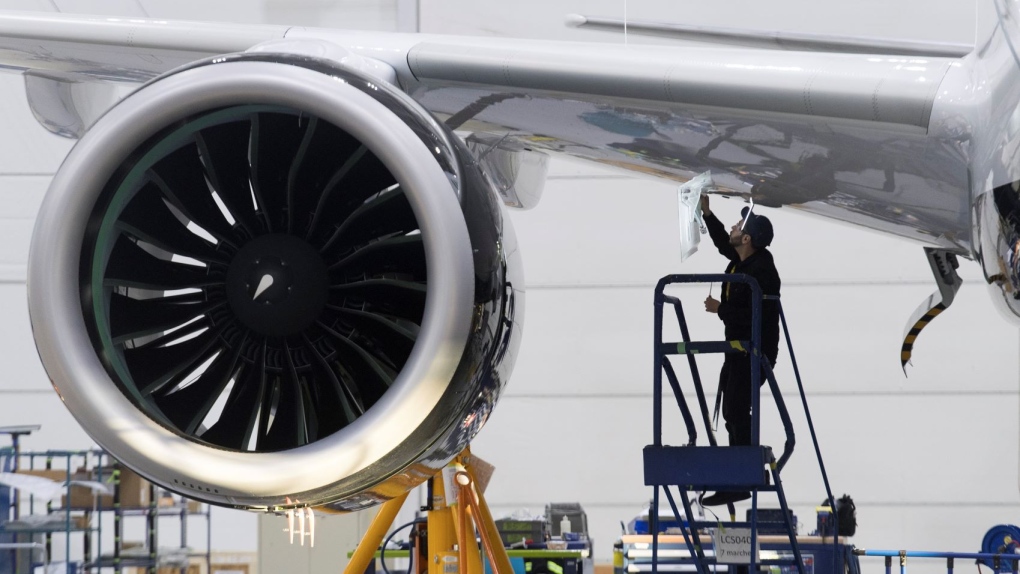Quebec lost $7 billion last year due to labour shortage in manufacturing sector, group says
 An Airbus employee works under the wing of an Airbus A220 at the assembly plant in Mirabel, Que., Thursday, February 20, 2020. THE CANADIAN PRESS/Graham Hughes
An Airbus employee works under the wing of an Airbus A220 at the assembly plant in Mirabel, Que., Thursday, February 20, 2020. THE CANADIAN PRESS/Graham Hughes
Quebec's economy is losing about $7 billion because of a labour shortage slowing down activity in the manufacturing sector, according to estimates from an association that represents the sector.
Nearly all of the sector's companies — 98 per cent — say they have vacancies to fill, according to a survey of 300 of its members by the Quebec Manufacturers and Exporters (MEQ). On average, respondents had 42 vacancies in their companies.
"Over the past year, Quebec manufacturers have $7 billion left on the table because they don't have the workers they need," said MEQ president and CEO Véronique Proulx at a press conference Wednesday. "We can't find the hands and skills, the brains we need, to keep our plants running."
The $7 billion in missed opportunities would represent about 3.8 per cent of Quebec's total manufacturing sales of $183 billion.
There were 32,000 job openings in Quebec's manufacturing sector in 2022 in the second quarter, according to Statistics Canada data. This is up from 30,700 in the first quarter, three months earlier.
Hiring in the manufacturing sector is like trying to "fish in an empty lake," according to Proulx. This lack of workers is causing manufacturing companies to lose important business opportunities, she warned.
She noted that 75 have delayed or cancelled some investments.
Aerospace supplier Meloche Group, for example, has been forced to give up contracts worth an estimated $12 million because of the lack of personnel, said Anne-Renée Meloche, vice-president of human resources.
The company has 75 active foreign recruitment requests, but Meloche deplored the cumbersome administrative process.
"This year, what we have seen is the shortage of manpower, but especially the slowdown, the slowness, the complexity for us and for all Quebec employers with respect to immigration and international recruitment," Meloche said.
"These kinds of missed opportunities are leading some companies to consider moving their production outside of Quebec. Three out of 10 companies say they have considered moving part of their operations abroad or doing business with foreign suppliers. When you move operations outside Quebec, it's very rare that you bring them back," Proulx added.
The trend would have nothing to do with outsourcing, which had led companies to move their production to Asia, among other things, because of lower labour costs.
"We're elsewhere," said the MEQ president and CEO. "There are companies that plan to raise wages. It's really not an issue of wages and cost. What we are looking for is competent people to work in our plants."
The MEQ is asking the government to increase the number of qualified workers available for the manufacturing sector. It also means facilitating and accelerating the arrival of temporary foreign workers.
The association is also asking the government to adjust the training offer to "target in priority" the manufacturing sector and to provide more support to companies that want to automate their production line.
The MEQ is not the only business association trying to measure the financial impact of the labour shortage. In August, the Canadian Federation of Independent Business (CFIB) estimated that the labour shortage would have forced Quebec SMEs to give up nearly $10.7 billion in contracts.
This report by The Canadian Press was first published in French on Nov. 16, 2022.
CTVNews.ca Top Stories

Ministers Joly, LeBlanc travel to Florida to meet with Trump's team
Two members of Prime Minister Justin Trudeau's cabinet will be in Palm Beach, Fla., Friday to meet with members of Donald Trump's team.
India alleges widespread trafficking of international students through Canada to U.S.
Indian law enforcement agencies say they are investigating alleged links between dozens of colleges in Canada and two 'entities' in Mumbai accused of illegally ferrying students across the Canada-United States border.
Teen actor Hudson Meek, who appeared in 'Baby Driver,' dies after falling from moving vehicle
Hudson Meek, the 16-year-old actor who appeared in 'Baby Driver,' died last week after falling from a moving vehicle in Vestavia Hills, Alabama, according to CNN affiliate WVTM.
Hwy. 401 off-ramp shut down due to Boxing Day deal-hunters now reopen
A Highway 401 off-ramp west of Toronto that became so clogged up with Boxing Day deal-hunters Thursday that police had to shut it down out of safety concerns has re-opened.
Florida pizza deliverer charged with stabbing pregnant woman after tip dispute
A pizza deliverer in central Florida has been charged with pushing her way into a motel room with an accomplice and stabbing a pregnant woman after a dispute over a tip, authorities said.
Christmas Eve stowaway caught on Delta airplane at Seattle airport
A stowaway was caught trying to nab a ride on a Delta Air Lines plane at Seattle-Tacoma International Airport on Christmas Eve.
2 minors, 2 adults critically injured in south Calgary crash; incident was preceded by a robbery
Multiple people were rushed to hospital, including two minors, in the aftermath of a serious vehicle collision on Thursday morning.
B.C woman awarded nearly $750K in court case against contractor
A B.C. woman has been awarded nearly $750,000 in damages in a dispute with a contractor who strung her along for a year and a half and failed to complete a renovation, according to a recent court decision.
Aviation experts say Russia's air defence fire likely caused Azerbaijan plane crash as nation mourns
Aviation experts said Thursday that Russian air defence fire was likely responsible for the Azerbaijani plane crash the day before that killed 38 people and left all 29 survivors injured.

































